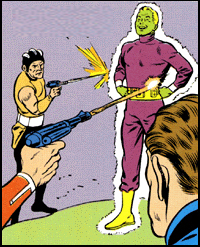
I tried the Onion for a short time but Mad magazine will be my first, and only, love.
When the mysterious cleaning of Martian rovers Spirit and Opportunity was first observed last December, a leading theory among Jet Propulsion Laboratory scientists suggested dust devils might be carrying sediment up and away from solar panels. Three weeks ago, wind activity was determined to be the cause. And the dust devils? Spirit has been photographing a flock of them.
Today's early-morning preview of ticker headlines was again buttonholed by a reference to a "wave of violence" in Iraq, which in turn led to a story headlining the "surge of violence" in the democratizing country. As Wretchard would insist, the "violence" is not a remote phenomenon but in fact attempts on the lives of the innocent and those who protect them. Austin Bay has fit research to the observation that terrorist mayhem in Iraq increasingly devolves into feckless, if compulsive and deadly, gangsterdom. A look at today's hit-jobs trace the same pattern: a trio of car bombs directed at policemen, succeeding in the crumpling of a building and the death and injury of several people who happened on the scene at the wrong moment. Tragic for those affected, yes; but the events fail to describe conditions in the country, and hardly rise to the one-sided hyperbole that is now standard to elite media narratives. Accuracy would be served if news agencies collected additional, reasonably available information and published stories on how a series of attacks by thugs on weak targets, say, failed to disrupt the lives and businesses of millions of Iraqis, thousands of Allied troops and hundreds of public works projects.
It used to be that anecdote defined what was found outside of the newspaper, judged to be a worthy arbiter of representative fact. Baghdad, the stories tell us, strains under the wailing terrorist strikes. Omar and his brothers would sternly disagree, and the online photo album to which they linked begs retraction of the dire claims. We don't see strange, alien rituals in a savage landscape. Are even the bums prey for a politicized obsession with catastrophe?
Iraq's challenges must be recognized, lest the Allies' necessity and the serious danger in remaining terrorist regimes — particularly those couched in Tehran and Damascus — be cheapened. But what of the nation's progress? While terrorists succeed in beaming feeds of compressed disaster directly to Washington they fail to sell the conjured impression to Iraqis or their colleagues. Police, often physically undermatched, are culturally central and when attacked add, rather than subtract, to self-confidence. One building is sabotaged, a dozen more are raised. It is evident and abundant:
Last month, 31 schools were completed, with 10 of those in the Samarra District. April projections are for another 44 schools to be completed. The renovation projects in Salah ad Din will positively affect over 13,000 Iraqi students and boost the local economy in the form of labor, materials, and subcontracts. The use of local contractors and local labor has been instrumental in inspiring pride in the local communities and injecting money into the local economies....As March ended, 89 projects completed within the Gulf Region Northern District, which includes the seven northern provinces of Dahok, Diyala, Erbil, Kirkuk, Ninewa, Salah ad Din and Sulaymaniyah. Currently there are more than 475 projects in progress, with over 180 projects forecast completed, and 99 projects forecast to begin this month.
Iraq can survive poor press. Will the press survive Iraq?

What's to improve? NASA's showing off this raw image obtained by the Cassini spacecraft on its closest pass by Saturnine moon Titan.
I'm confident now that my reflection on Pope John Paul II, written a fortnight ago, was neither a fleeting sensation nor an unintentional reply to the commotion. Karol's death reminded me to consider the inalterable difference between opinion and belief, preference and object. That Joseph Ratzinger and I are of different Christian churches makes for inevitable disagreement. But considering what I've put forth in my work over three years, there is more like than unlike:
On Monday, Ratzinger, who was the powerful dean of the College of Cardinals, used his homily at the Mass dedicated to electing the next pope to warn the faithful about tendencies that he considered dangers to the faith: sects, ideologies like Marxism, liberalism, atheism, agnosticism and relativism — the ideology that there are no absolute truths."Having a clear faith, based on the creed of the church, is often labeled today as a fundamentalism," he said, speaking in Italian. "Whereas relativism, which is letting oneself be tossed and 'swept along by every wind of teaching,' looks like the only attitude acceptable to today's standards."
Two apart can share a destination. To Benedict XVI.

One aspect of news of late, especially that of major foreign events, is its remarkable constancy. Japan's ascension has been met with predictable calumny; Iraq and Afghanistan are moving well along, despite gangster attacks that receive far more press significance than they deserve; the modernity in Lebanon rises while Syria's ossified Arab fascism cracks and sinks; the Democratic Party and the left score well for effort but ultimately fail. I, like anyone else, respond to events as much as inspiration; and I'm willing to lose a little in quantity to gain in relevance and characteristic perspective. Besides; we can all agree that spring is just a bit distracting.
NOTE TO A NOTE: Sadly, my senator George Voinovich proved to be the fulcrum Senate Foreign Relations Committee Democrats needed to swing United Nations Ambassador nominee John Bolton into another series of frivolous and spurious accusations. Last November I punched the ballot card for Voinovich reluctantly, the senator's grandstanding against President Bush's second tax relief legislation foremost on my mind. I've pledged not to undervote when a Republican is on the ballot — so I would very much like to see another party candidate take Voinovich's place in 2010.
The meddling of foreign diplomats and intellectuals in Iraq's affairs goes on, reports Michael Rubin, despite politics having been cemented in autonomy by the will of the governed:
Most Iraqis remain grateful for the liberation which made elections possible, but they resent the manner in which U.S.-Iraqi partnership degenerated into occupation. The issue is not the presence of American troops. Iraqis across the ethnic and sectarian spectrum recognize that members of the Coalition are putting their lives on the line for Iraq's future. Rather, the issue is arrogance....The issues facing Iraq are vast. Iraqis debate the role of religion in their society. Kurds, Turkmen, and Arabs debate the future of Kirkuk. Discussions relating to a Basra-centered southern Iraqi federal unit are picking up. An increasingly mature and independent Iraqi press is at the forefront of investigating corruption. The arguments Iraqis have are long and sometimes heated. But, as the January 30 turnout showed, Iraqis take great pride in their sovereignty. The White House does too. Unfortunately, no one has yet told the American embassy.
More stories like this one are bound to be heard as the Allies struggle to maintain a balance between continuing aid, guidance and security to Baghdad's fledgling leaders — and a particular silence on matters that are decided within the country's growing circlet of independence. The interest in good, liberal and stable government is valid. Coalition nations are entitled to see that their monetary and military investments reach the Iraqi population as intended; Iraqis themselves deserve a state that embraces honesty and integrity, discarding the poisoned artifacts of dictatorship. The process of decoupling will not be without its misunderstandings and embarrassments. Still, Iraq has earned a degree of administrative sanction and leeway — certainly enough to tell self-serving bureaucrats to jump in a lake.
It's likely to be a handshake felt 'round the web:
Adobe Systems Inc., one of the world's largest providers of document-design software, will acquire Macromedia Inc. in an all-stock transaction valued at approximately $3.4 billion, the companies announced Monday. Adobe's software includes the popular Acrobat and Photoshop program. San Francisco-based Macromedia makes the Dreamweaver and Flash web-design software.Combining the two businesses, the companies said, will allow them to create more powerful software programs that can be used across multiple operating systems, which should pave the way for expansion into new markets. ...The companies said they are in the midst of developing "integration plans" that will build on their similarities. They made no mention of layoffs.
Although Adobe Photoshop is my workhorse program at the office Macromedia's Dreamweaver and Fireworks are critical applications for properly exporting material to the internet (much better than, ironically, Adobe's piecemeal ImageReady). This is the second time in two years Adobe has not only sought to buy the assets of a company whose products I use but has selected a developer at the top of its game. In May of 2003, Adobe acquired Syntrillium Software, whose flagship audio production application Cool Edit Pro had been my staple for mixing since 1999; Adobe's method of absorption was both respectful of the smaller firm and mindful of continued market success, integrating new staff as a whole. Syntrillium employees could look forward to essentially the same job with greater resources at their disposal while Adobe would gain a well-received, sales-tested product alongside a seasoned audio software division. It appears Macromedia will receive the same warm welcome. If federally approved and privately concluded, this marriage should not disappoint.
I've received an e-mail forward from activist Banafsheh Zand-Bonazzi that carries some bothersome news. Daneshjoo.org, website for the Student Movement Coordination Committee for Democracy in Iran, has been taken down due to lack of funds. If you are at all able to donate, SMCCDT asks that it be done through PayPal. Simply log in and denote to "SMCCDI - Daneshjoo" as recipient via their e-mail address.
Catch a leftist in an affront to the public record and he'll throw everything from Jim Crow to Mahatma Gandhi to trip you up. Glenn Reynolds overturned syndicated columnist Sylvester Brown's try at the most repulsive illiberal canard against President Bush's success in establishing a democratic vision for the Near East. In retaliation, Brown stooped lower, chiding American license to judgment with the scold's adage: a drunk who goes sober is forever that drunk.
Glenn does well knocking aside Brown's misappropriation of a Gandhi quotation: indeed, the only ones who are forced to accept democracy are a nation's strongman minority. As for Gandhi's moral implications, satyagraha is an appeal to conscience; it is useless if an oppressor has none. In Kiev and Beirut, buttressed by international succor and arms, it can succeed. In Saddam Hussein's Iraq, as one of Glenn's correpondents has pointed out, it could not. Gandhi showed us just how much pride and arrogance can be held by a man in rags, to have thought that his singular experience in British India defined Adolf Hitler better than the simple metric of good and evil — demonstrating, from the error, that peace is made only with peaceable men.
Dwelling too much on the failures of men ends in relativism and misanthropy. Liberating Iraq was a judgment of Saddam Hussein and dictatorship, and Brown argues that flawed men and states can do no good. Yet every American shortfall Brown recites is one that has been overcome by those who have seen wrong and moved to correct it. There could be no stronger repudiation of the balance-of-power doctrine than the president's 2005 State of the Union address.
This past week despotisms and free-world intellectuals with axes to grind were looking to mar Japan's stride towards complete, democratic sovereignty. It doesn't matter that Japan paid dearly for its crimes in war, or that it has become a model in sixty years of liberalism; redemption and transcendence, and the good Tokyo has and will accomplish matter far less to Japan's detractors than does revenge and a troubling design to thwart ideals guiding the new country. So which does Sylvester Brown want more, Third World liberty or Western guilt?
